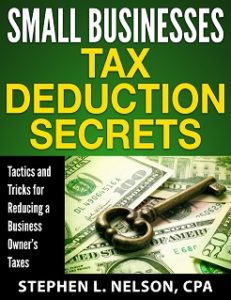We get a lot of questions from people who earn money outside the United States and wonder how, and if, U.S. income taxes can be avoided.
For this reason, we’ll try to answer here the common questions we get with good “general” answers. (If you need more specific answers, you want to contact a local tax accountant and give him or her the details of your situation.)
Do I have to pay U.S. taxes on income I’ve earned from other countries?
Generally speaking, yes.
U.S. citizens and permanent residents owe U.S. income tax on their worldwide income, not just on income they earn in the United States. The one exception to this rule is if the income in question can be excluded due to the foreign earned income exclusion. In addition, taxpayers can often take a credit for the amount they pay in foreign income taxes.
How does the foreign earned income exclusion work?
Under IRC § 911, U.S. taxpayers who spend most of the year abroad can opt to exclude up to about $100,000 of foreign earned income from their U.S. taxable income. (The exact amount adjusts for inflation every year, and in 2014 was $99,200 per individual.) Foreign earned income includes things such as salaries, wages, and self-employment income.
You qualify for the foreign earned income exclusion if your tax home is in a foreign country and you meet one of two tests: either the bona fide residence test or the physical presence test. You meet the bona fide residence test if you are a resident of a foreign country for an uninterrupted period that lasts an entire tax year. You meet the physical presence test if you are physically present in a foreign country or countries for at least 330 days during a consecutive 12-month period.
Sometimes you can qualify for the foreign earned income exclusion—even if you don’t meet the two tests described above—because you were forced out of the foreign country due to war, civil unrest, or something similar.
In addition, if you work abroad, you may be able to claim a tax benefit for your housing costs. You may be able to exclude from income housing costs your employer pays. For any housing costs you pay, you may be entitled to a deduction.
I work for a supranational entity (e.g., the UN, the IMF). How do I report my earnings?
You report your earnings from a supranational entity on line 7 of your 1040 just like any other wages, but you must pay self-employment tax on the money you’ve earned inside the United States. (Our experience is that these supranational entities will tell you what portion of your income you can exclude from self-employment taxes because you earned that money outside the United States.)
This is because even though payments from your employer are wages, the International Organization Immunities Act exempts these organizations from withholding Social Security or Medicare tax from your wages. Accordingly, these organizations don’t file a W-2 for your wages.
Note that some supranational employers reimburse their employees for any U.S. income taxes they must pay on their earnings in an attempt to equalize things with employees of other nations who do not owe income taxes on their earnings. Inquire with your employer to check if they will provide you with such a reimbursement.
Am I getting taxed twice, then?
Probably not. If you’ve earned money offshore and some other country has already taxed you, you do need to report the income to the United States. And you may pay taxes on the money. But in general, any taxes you’ve paid to some foreign country on the income can be deducted from the U.S. taxes you owe on the income.
The precise calculations can sometimes be a little bit tricky, though, as I describe next.
How does the foreign tax credit work?
If you have foreign-source income and pay foreign income taxes on it, you can claim a tax credit for the amount of foreign tax you paid against any U.S. income taxes you owe on that same income. However, your credit is limited to the amount of U.S. income taxes you owe on the income. You generally claim the credit by filing Form 1116.
It’s easier to explain this by illustrating it with an example. (Though fair warning, this has been a bit oversimplified to illustrate conceptually how the foreign tax credit is supposed to work.)
Suppose Bob has $1,000 of dividend income that’s properly sourced to the country of Freedonia. Freedonia withholds 30% of this dividend, or $300, for income taxes. Bob owes U.S. taxes on the dividend income at a rate of 15%. On his U.S. income tax return, Bob reports that he owes $150 of income tax due to the dividends, which he includes on line 44 of his 1040. Then he goes on to figure how much of a foreign tax credit he can claim to offset this $150 of tax. He compares how much income tax he paid to Freedonia ($300) to how much U.S. income tax he owes ($150), and claims the smaller of the two as his credit.
How can my business claim the foreign tax credit?
If your business has foreign-source income and pays foreign income taxes on it, you can generally claim a tax credit for the amount of foreign tax the business paid.
For pass-through entities (partnerships and S corporations), the business’s owners will receive foreign tax credit information on their Schedules K-1. These individuals claim the foreign tax credit by filing Form 1116. For C corporations, the credit is counted against the business’s corporate income tax and is reported on Form 1118.
Small-Business Owners Often Pay Too Much Tax
 It is common for small-business owners to do a poor job maximizing their legitimate tax deductions. They don’t, for example, structure their operations to protect legitimate deductions. They usually don’t do enough to create new deductions. And rarely do they understand how to recycle, or double-deduct, amounts that can be used more than once.
It is common for small-business owners to do a poor job maximizing their legitimate tax deductions. They don’t, for example, structure their operations to protect legitimate deductions. They usually don’t do enough to create new deductions. And rarely do they understand how to recycle, or double-deduct, amounts that can be used more than once.
That is all a financial tragedy! Getting smarter about tax deductions can save you a bundle.
If you’re thinking after reading this that maybe you can do a better job with your tax deductions, consider our $40 ebook Small Businesses Tax Deduction Secrets.
This 70-page ebook provides detailed instructions about how you can annually save thousands of dollars in income and related taxes simply by more effectively using legitimate small-business tax deductions. Interested in more detailed information? Click here.
Tip: If you are one of our clients, don’t purchase this ebook—or any of our others. Just email us and ask for your complimentary copy.
Immediately Downloadable & Money-Back Guarantee
The book is instantly downloadable upon purchase.
Also, we provide a money-back guarantee. If you don’t get the information you need or want, just email us and request your refund.
